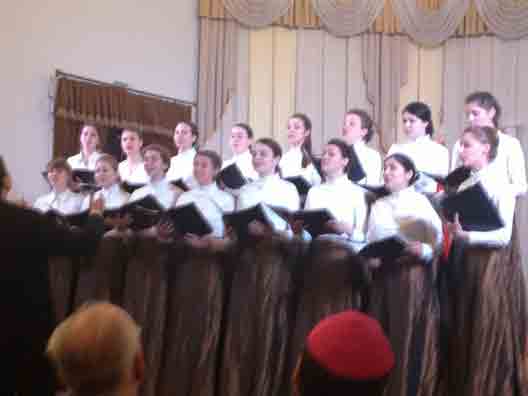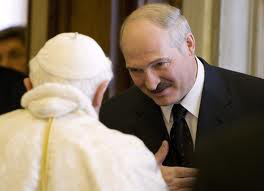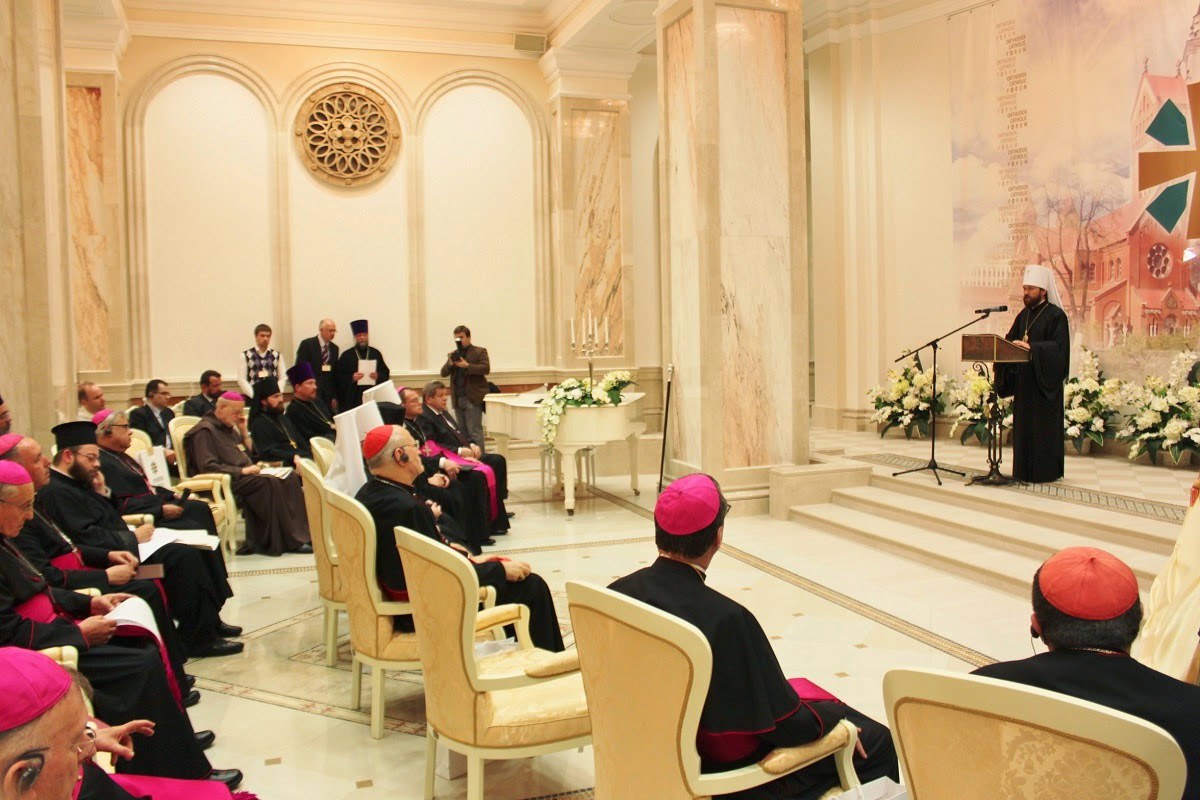June 3, 2014, Tuesday — Concert in Minsk
“Today Christian belief represents an inalienable component of the outlook and the spiritual life of the majority of our citizens… It is very important and encouraging that the Orthodox Church and the Catholic Church in Europe are trying to find new forms of inter-Christian solidarity” —Alexander Lukashenko, President of Belarus, today in Minsk as he received the participants in the 4th Orthodox-Catholic Forum, including Cardinal Peter Erdo of Budapest and Bishop Paolo Pezzi of Moscow on the Catholic side; the Forum is meeting here from June 2-5
Paradox of paradoxes — who would have believed it?
A peculiar cultural-spiritual inversion is reversing some long-held roles in Europe.
East of the old “Iron Curtain,” once Soviet and atheist, political and cultural leaders are now increasingly encouraging a return to a traditional Christian outlook on life. A conversion from Marxist atheism to religious faith, if you will.
West of that old divide, in countries where a vibrant Christian culture once shaped all aspects of human life, from holy days (holidays) to entire legal systems, from architecture (magnificent cathedrals) to music (Requiem Masses), political and cultural leaders are increasingly embracing a relativistic materialism which marginalizes or excludes traditional Christian faith.
The East is embracing faith, and the West renouncing it.
The world has turned upside down, or inside out.
In the formerly Communist east, leaders like Vladimir Putin in Russia (a former KGB agent) and now Alexander Lukashenko in Belarus (White Russia) are speaking about faith in God as essential for human society and personal happiness.
In the West, leaders and opinion-makers are ignoring or even mocking the traditional teachings and expressions of the Christian faith.
What is going on? How important is it, and how real? Is it a superficial phenomenon, all surface, no substance? Or does it reflect a profound cultural shift? And, if it is not superficial, what could be its consequences?
The answers are, of course, not clear. But the questions are valid, as events in Minsk today testified.
Alexander Grigoryevich Lukashenko, 59, President of Belarus for almost 20 years, since 1994, took an hour out of his busy schedule to meet with a group of Orthodox and Catholic bishops and priests who are taking part in an Orthodox-Catholic Forum here in hopes of building a sort of “pragmatic alliance” in the current cultural war raging in the West.
Lukashenko worked as director of a state-owned agricultural farm and spent time with the Soviet Border Troops and the Soviet Army before he became president.
But this former Soviet soldier gave the group his blessing.
Echoing remarks of Putin in recent months, Lukashenko spoke in no uncertain terms in favor of religious faith.
Orthodoxy and Catholicism have played their part in history to determine the mentality and the national character of the Belarusian nation, Lukashenko told his visitors. “And today Christian belief represents an inalienable component of the outlook and the spiritual life of the majority of our citizens.”
And he even cited the French Jesuit philosopher Father Pierre Teilhard de Chardin, who died half a century ago.
“Global tasks facing the humankind today can be addressed only by joint efforts,” Lukashenko said. “In the 1950s, the famous French philosopher Pierre Teilhard de Chardin said that nations had become so interdependent economically and psychologically that they could grow further only by interpenetrating each other.”
Lukashenko then made some remarks about moral values which might have been made by a Christian religious leader. “We are witnessing the decline of morals, rejection of Christian values and destruction of traditional family structures in many countries of the West,” he said. “The cult of consumption and the pursuit of pleasure threaten to corrupt the society and debase the moral principles of states. The establishment of a new world order based on these principles will ruthlessly blur the historical and cultural differences between peoples, their priceless, centuries-old family values and traditions of statehood, the rational way of life and interaction with nature and society.”
It is time to remember that it was Christian worldview that shaped the European culture and civilization, Lukashenko continued.
The solution of many vital issues is impossible without active participation of Eastern Orthodox and Catholic believes, he said.
“It is very important and encouraging that the Orthodox Church and the Catholic Church in Europe are trying to find new forms of inter-Christian solidarity,” he said.
And he said, with approval, that the members of the Forum were following the teaching of St. Paul.
“The Church can do a lot to bring people closer and to unite the international community around genuine values,” he said. “By word and deed, just like Saint Apostle Paul taught, you call for uniting efforts of representatives of various confessions in order to make our planet a calm and cozy home for all its children.”
He concluded: “Your coming to Minsk for work and for human interaction is a significant event in the spiritual life of the Belarusians. It indicates the recognition of the fact that our nation stays committed to Christian values.”
There was then an exchange of gifts between the president and the Forum participants.
Later, in the evening, the mayor of Minsk, Mikalai Ladutska, hosted the Forum participants for a very special concert.

The city had evidently made a considerable effort to honor the Forum guests and to leave them with a memory of the city’s culture and hospitality.
And so, in these ways, Belarus as a whole and Minsk in particular made a bid to be considered a privileged place for religious dialogue and for the religious renewal of European society.
In this context, it may be recalled that when President Lukashenko visited the Vatican in April, 2009, he carried a message from the Patriarch of Moscow and all Russia, Kirill. Talking to Pope Benedict XVI (photo), he expressed the hope 
But perhaps a first-ever meeting between a Roman pontiff and a Russian Patriarch, in Minsk, is still on Lukashenko’s mind…
===============================
During sessions today, participants at the Forum delivered papers on ways the Christians of Europe can respond in a united way to the social, cultural and political challenges they now face. (The papers will be published after the Forum ends.)
==================================================
Controversial Remarks
Metropolitan Hilarion at Orthodox-Catholic Forum: Uniates at fault
In opening the conference yesterday, Metropolitan Hilarion had some strong words regarding the situation in Ukraine. The address was not available in English yesterday, but has since been posted on the website of the Moscow Patriarchate.
Hilarion said that the Greek Orthodox Catholic Church as a whole bears blame for the “polarization” of the complex and increasingly dangerous situation of civil conflict in Ukraine.
His remarks reveal how very delicate and difficult the current Catholic-Orthodox process is. But they also reveal that, in this dialogue, each side is actually expressing its views, concerns, fears, hopes; that is, that a real dialogue, even if troubled and imperfect, is actually occurring.
This is not a small achievement in the context of a division which has endured for nearly 1,000 years.
In this context, the Orthodox-Catholic Forum remains a valuable initiative, and it is also in this context that Hilarion’s remarks are included here below.

Metropolitan Hilarion during his address yesterday at the opening of the Forum. In his remarks, he expressed particular concern about the situation in Ukraine, and faulted the Greek Catholics for what he charged is its “destructive role” in the “polarization” of Ukrainian society. His remarks, which were delivered in Russian, were posted last night on the web site of the Moscow Patriarchate
(mospat.ru) — Greetings by Metropolitan Hilarion of Volokolamsk to the Participants of the 4th European Orthodox-Catholic Forum (Minsk, 2 – 6 June 2014)
By Hilarion Alfeyev
Your Eminences and Graces,
Esteemed Fathers and Brothers,
Dear organizers and participants of the conference!
On behalf of His Holiness Patriarch Kirill of Moscow and All Rus and myself personally I would like to cordially greet all of the participants of the 4th European Orthodox-Catholic Forum, this year dedicated to the very relevant topic of religion and cultural pluralism: the challenges to the Christian Churches in Europe.
I would like to note with satisfaction that our meetings have become quite regular. The format of interaction decided upon in 2008 has proved to be of use since it allows us to react swiftly to events happening in the world. Previous sessions were devoted to such problems as the family, the Church and state, the economic crisis and poverty.
In the modern-day world there is not only an intensive dialogue of cultures but also cultures penetrate one another. These dynamic processes enable, on the one hand, the formation of a single world commonality, while on the other they enable a new means of examining the unique nature of various cultures.
The demographic situation is changing, and intensive migration continues afoot. The aim of building a tolerant society often leads to the opposite of that of the desired effect. The Christian identity of Europe is under threat. These problems make themselves felt ever more acutely in everyday life and demand a serious theoretical analysis.
However, in the present situation we cannot limit ourselves merely to the discussion of theoretical issues. We have to interact on a practical level too.
Unfortunately, our forum is being held against the background of the sad events in the Ukraine. People are dying during this political stand-off while gunfire can still be heard on the streets and squares. The people remain deeply divided not only according to their political choices but also on religious lines. Sadly, the Greek Catholics have played a very destructive role in allowing this situation to develop. The words of their leading archbishop, hierarchs and clergy and an extremely politicized position have brought about the polarization of society and a worsening of the conflict which has already led to numerous victims.
Unlike the canonical Ukrainian Orthodox Church, which has been able during these difficult months to unite people of various political persuasions, including those who have found themselves on both sides of the barricades, the Uniates have ostentatiously associated themselves with only one of the belligerent forces. The aggressive words of the Uniates, actions directed at undermining the canonical Orthodox Church, active contacts with schismatics and the striving to divide a single multinational Russian Orthodox Church have caused great damage not only to the Ukraine and her citizens, but also to the Orthodox-Catholic dialogue. All of this has put us back a great distance, reminding us of the times when the Orthodox and Catholics viewed each other not as friends but as rivals.
Today once again it has been all the more obvious what the Orthodox knew – that the Unia was and, unfortunately, remains a special project of the Catholic Church aimed at undermining canonical Orthodoxy. It was here, in the country of Byelorussia, that the notorious ‘the Union of Brest’ of 1596 was concluded and which brought untold suffering to the Orthodox population of these lands.
Allow me to use this platform to appeal to all our partners in the Orthodox-Catholic dialogue to do all that is possible to cool down the ‘hotheads’ among the Uniates, to halt the actions of the Greek Catholics in making the crisis in the Ukraine worse.
Today one part of the Catholic Church is employing all her strength, talents and resources in strengthening Orthodox-Catholic interaction, while another (even though it enjoys autonomous status) is doing everything possible, as in former unfortunate times, to drive the wedge of distrust and enmity between Orthodox and Catholics.
Our Forum, attended by Orthodox and Catholic theologians, is an important arena for both studying those issues that are of common interest and for achieving greater mutual understanding between our Churches.
And I would like very much that our labours bore not only a theoretical nature but also be applied on the practical level in enabling the pacifying of enmity and the strengthening of Orthodox-Catholic interaction before the new challenges that confront us.
I wish you all success in your forthcoming labours.
============================
The Anthropological Question
“You live in a deranged age, more deranged than usual, because, in spite of great scientific and technological advances, man has not the faintest idea of who he is or what he is doing.” —Walker Percy (1916-1990), American Catholic convert and writer, author of The Message in the Bottle and Lost in the Cosmos






Facebook Comments